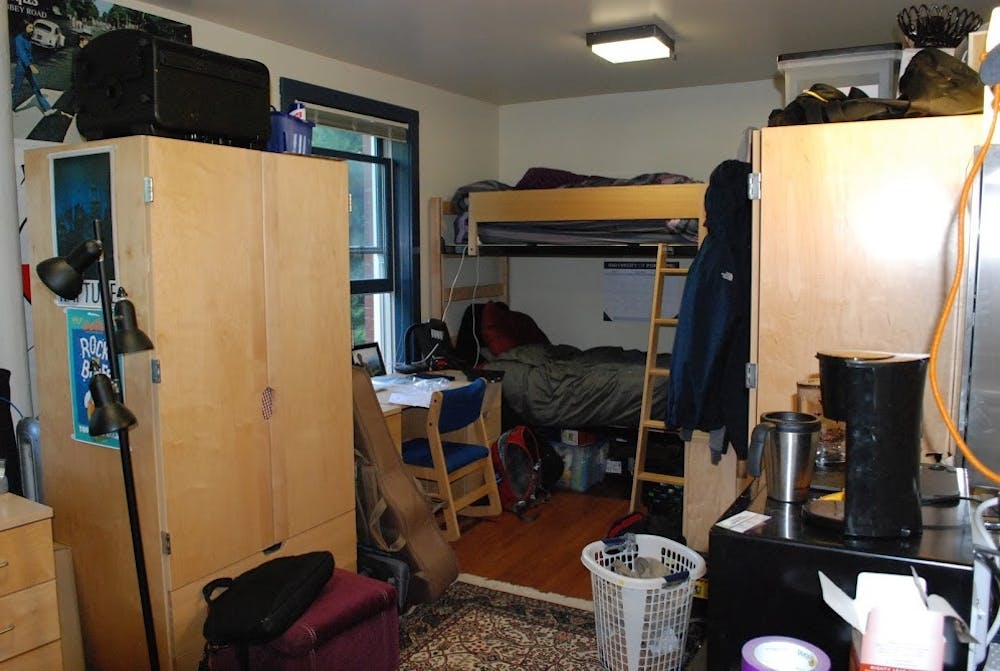by Ryan Myers |
The University of Portland is a school on the rise, with plans for expansion being made a reality around campus. As the school draws students from around the country, and the world, the demand for on-campus housing has increased. Couple that with rising rent in the surrounding neighborhoods, as well an effort to retain upperclassmen in on-campus housing, and you have a recipe for overcrowding.
In the dorms, this has pushed hundreds of students into “extended living” situations, colloquially referred to as forced triples. Some converted study rooms house as many as five students. Many in the community, especially those who came expecting the “small college feel,” are left wondering what the school will do about the issue.
The answers fall into two categories: the short term and the long term. The short-term solution is the increase in extended living situations, and the long-term involves the construction of a new dorm adjacent to Haggerty and Tyson halls which is scheduled to be completed before the start of the 2016-17 school year.
Chris Haug, Director of Residence Life at UP, said that the situation is not new, and that it has caused the leadership to expand their efforts to welcome and accommodate these students in the past few years, as well as now.
Haug notes the extended doubles have been working well as a short-term fix.
“They are a necessary short-term solution, which we have had incredible success with,” Haug said.
Extended doubles were at their highest rate of use last year. As of June 16, 305 students were signed up for extended doubles for this school year, although official final numbers have yet to be determined.
Last school year, 91 percent of on-campus students reported being either somewhat or very satisfied with their housing, as determined by Residence Life surveys, compared to 90 percent for the 2013-14 school year. Haug said that these satisfaction rates are higher than in years past which had fewer extended doubles.
Haug said the new dorm hall isn’t the perfect fix, pointing out that if the retention rate remains high for on-campus living along with steady or increased enrollment, extended living situations will still be utilized.
Hall directors know first hand the effects of adding a new residence hall.
“This new hall will be representing this new generation of the University, and will have its own identity and will complement the existing residence halls,” Sr. Susan Bruno, Fields Hall Director, said.
Bruno stressed the importance of hall staff communication in making sure that the extended living situations run smoothly. A key part of the short term plan is to build community within the dorm and to make sure that students use effective communication with one another. This is intended to decrease issues that might arise because of limited space.
While students wait for the new dorm, resident assistants are prepared to mediate situations that might arise because of crowded rooms. Senior Steph Hampel, RA for the second floor of Fields Hall, is one such mediator. She pointed out that beyond the move-in day skepticism of students and parents, the residents do not seem to have a problem with the amount of space they have.
“People are pretty adaptable when it comes to their space and their living environment,” Hampel said.
While adaptability is key when entering any new environment, the students currently living in these extended doubles do face issues on a daily basis.
“The space really gets us… If you are trying to hurry it’s really hard,” Freshman nursing major Kaitlyn Ringus said.
Several other Fields students shared the sentiment and talked about issues arising from sharing space among three people, and from sharing already limited common spaces with both Fields and Schoenfeldt residents.
Ringus said that the first impression of her room was certainly a let down, and she feels her experiences are common among Fields residents, although she is focusing on the positives.
“I love everyone here… It’s a space issue, that’s what it is,” Ringus said.
The students currently living in these rooms are waiting to see how the year will play out, despite room conditions falling short of their expectations. Many Fields Hall residents cited passing up other schools for the University of Portland and are hopeful that their living situation this year, while unconventional, will be an inconvenience in an otherwise positive college experience.
Ryan Myers is a reporter for The Beacon. He can be reached at myersr17@up.edu.








